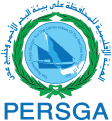Project Component Description
The SFISH Project includes three components: Component (1): Strengthening regional collaboration in management of marine fisheries and aquaculture in PERSGA region, which is implemented by PERSGA; Component (2): Improving economic opportunities, food security and effective management of fishery production in Yemen, which is implemented by the UNDP; and Component (3): Project management, which includes two subcomponents to be implemented by PERSGA (Subcomponent 3.1) and UNDP (Subcomponent 3.2), each respective to its administered technical component.
The following provides an overview of the SFISH Regional Component (Project Component 1 and management Subcomponent 3.1) main activities and milestones that are be implemented by PERSGA.
Component 1: Strengthening regional collaboration in management of marine fisheries and aquaculture in PERSGA region
The component aims to strengthen and sustain regional collaboration through support to science-based management of fisheries in PERSGA, development of a regional platform for coordination of policies, legislation, management plans and measures for responsible fisheries and aquaculture and use of ecosystems approaches, and support to regional level capacity building and technical assistance program on management of living marine resources responding to both anthropogenic and climate impacts.
Thus, interventions by the PERSGA regional component of the project mainly includes technical assistance, training, provision of goods and related consultancy services, and operational costs, which focus on:
- Building regional database system for knowledge and information management (KIMS)
- Promoting PERSGA institutional capacity update guidelines for finance and procurement management procedures, and project management including environmental and social risk management.
- Develop and update regional technical guidelines and standard methods for LMR and fisheries data collection and statistics.
- Upgrading software system for oil spill tracking assisting response and mitigating impacts of oil pollution on fisheries and their critical habitats.
- Undertaking review assessments of the status/ management, and updating/ developing harmonized procedures/ action plans and promote capacities in PERSGA region, mainly for:
− IUU fishing, fish spawning aggregations and fishery by-catch.
− Fisheries statistics, stock assessments and monitoring for priority fisheries.
− Critical fish habitats restoration mapping programs
− Action plans for fisheries conservation measures addressing sharks, marine turtles, seabirds and marine mammals.
− Aquaculture best practices, EIA and biosecurity measures and systems
− Climate Change adaptation and mitigation measures, and resilience for PERSGA fishery and aquaculture sector.
− Status and trend of fisheries indicators and reporting process - Develop and deliver tailored regional training programs and workshops on the above subjects and issues.
- Organizing regional coordination platforms and meetings in sustainable fishery and aquaculture policies, action planning and management.
- Production and dissemination of awareness outreaches; brochures, pamphlets, newsletter, short videos, documentaries and supporting awareness campaigns.
- Financial management, procurement functions, ESS standards, monitoring and evaluation, and reporting process of the project management.
The above component interventions and activities are designed to be implemented under three technical subcomponents, including:
a) PERSGA Regional knowledge and information management system (KIMS), monitoring and institutional capacity.
b) Regional platforms for capacity building and regional coordination of sustainable fisheries and aquaculture in the regional cooperation mechanism.
c) Enhanced communication strategies and awareness for citizen, private sector and development partner engagement in the regional sustainable fishery development.
Subcomponent 3.1: Project management, monitoring and evaluation and reporting by PERSGA
This subcomponent includes technical assistance, training, operating costs, and goods for PERSGA for management of the regional activities ensuring technical, fiduciary, environmental and social, parameters, and developing and maintaining a grievance mechanism (GM). It will also support ongoing communication activities to raise awareness about the SFISH Program and implementation progress, ensure effective engagement of stakeholders at PERSGA level.
